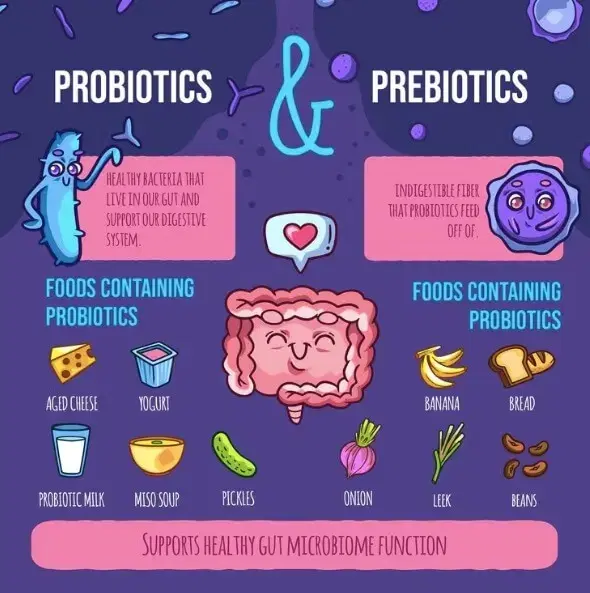
Exploring the Relationship Between Gut Health and Autoimmune Diseases.
Autoimmune diseases (ADs) are a complex group of disorders where the body’s immune system mistakenly attacks its own tissues. Understanding the relationship between gut health and autoimmune diseases is crucial, as recent research highlights the gut’s significant influence on our immune system. In this blog, we’ll delve into the intricacies of autoimmune diseases, explore the pivotal role of gut health, and discuss how maintaining a balanced gut can help manage and potentially prevent these conditions.
Understanding Autoimmune Diseases.
Autoimmune disorders occur when the immune system, which is designed to protect the body from harmful invaders, mistakenly targets its own cells. Common autoimmune diseases include:
- Type-1 Diabetes: The immune system attacks insulin-producing cells in the pancreas.
- Rheumatoid Arthritis (RA): Characterized by pain and inflammation in the joints.
- Systemic Lupus Erythematosus (SLE): A multisystem condition affecting various organs.
- Celiac Disease: Triggered by gluten consumption, leading to damage in the small intestine.
Globally, autoimmune diseases affect millions, with a significant prevalence in India as well. Studies indicate that lifestyle changes and increased environmental pollutants are contributing to the rise of these conditions in urban Indian populations.
The Role of the Immune System and Gut Health
The immune system is our body’s defense mechanism, protecting us from infections and diseases. A substantial part of this system resides in the gut, specifically in the gut-associated lymphoid tissue (GALT). The gut microbiome, a diverse community of microorganisms living in our digestive tract, plays a crucial role in maintaining immune health. A balanced microbiome helps in regulating immune responses and preventing the onset of autoimmune diseases.
Environmental Factors Influencing Autoimmune Diseases
Several environmental factors can trigger or exacerbate autoimmune diseases:
- Pollution: High pollution levels have been linked to increased risks of autoimmune diseases. A study by AIIMS found that people living near main roads, where pollution is high, had a higher likelihood of developing auto-antibodies.
- Toxins and Chemicals: Exposure to environmental toxins like mercury, silica, and pesticides can induce autoimmune responses and damage DNA.
- Infections: Frequent bacterial and viral infections can trigger autoimmune diseases, particularly in individuals with a genetic predisposition.
Symptoms and Impact on Gut Health
Autoimmune diseases manifest in various symptoms, including joint pain, fatigue, skin disorders, and digestive issues. Gut health plays a pivotal role in managing these symptoms. An imbalanced gut microbiome can exacerbate autoimmune responses, leading to chronic inflammation and digestive problems. Maintaining gut health can help alleviate symptoms and improve the quality of life for individuals with autoimmune diseases.
Gut Health and Its Influence on Autoimmune Diseases
Research has shown that gut health significantly influences autoimmune responses. The gut microbiome’s composition affects immune system functioning, and an imbalance can lead to autoimmune diseases. Studies have found that certain beneficial bacteria can help regulate immune responses, reducing inflammation and preventing autoimmune flare-ups. A balanced gut microbiome is essential in preventing and managing autoimmune diseases.
In India, digestive health issues are common, with a survey revealing that 56% of Indian families report such problems. Factors like dietary habits, lifestyle choices, and genetics play a significant role in influencing gut health. Traditional Indian diets, rich in fiber and fermented foods, can positively impact gut health. However, urbanization and dietary shifts towards processed foods have led to an increase in digestive and autoimmune disorders.
Read more about – Gut Health in Women: Hormonal Influences and Digestive Wellness Throughout the Menstrual Cycle.
Managing Autoimmune Diseases Through Gut Health.
Managing autoimmune diseases involves several strategies to improve gut health:
- Dietary Strategies: Incorporating probiotics, prebiotics, and fermented foods can enhance gut health. Foods like yogurt, kefir, and kimchi are excellent sources of beneficial bacteria.
- Dietary Fiber: Consuming adequate fiber helps maintain a healthy gut by promoting the growth of beneficial bacteria.
- Lifestyle Changes: Reducing stress, engaging in regular exercise, and ensuring adequate sleep are crucial for maintaining gut health and managing autoimmune diseases.
Gastroenterology specialists offer various services that can support patients with autoimmune diseases. Regular check-ups and personalized treatment plans are essential for comprehensive care. At Bangalore Gastro Centre, for instance, patients can receive expert guidance and support to manage their conditions effectively without overt promotion.
Moving Forward
Understanding the relationship between gut health and autoimmune diseases is essential for managing these complex conditions. A balanced gut microbiome can significantly influence immune responses, helping to prevent and manage autoimmune diseases. It’s crucial to seek professional advice and adopt lifestyle changes to maintain gut health and improve the quality of life.
